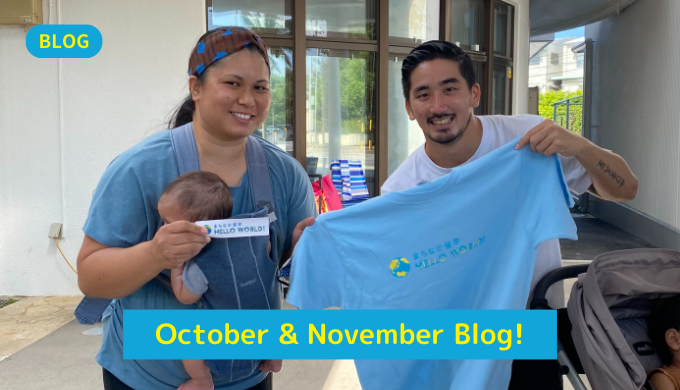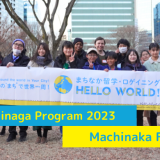Super Host Family Highlight – The Yamaguchi family!
Congratulations to our super host family for the month of September, the Yamaguchi family!
In September, the Yamaguchi family hosted 7 students, spread over 4 nights, and they received a score of 5 out of 5!
Justin, Mika, and their sweet kids have been hosting since July 2021! They love to share their Hawaiian lifestyle through food, like kalua pork and lau lau, as well as making leis and ukulele lessons! They bring a lot of fun energy to the Machinaka program.
The Yamaguchis are a wonderful family who have shown great dedication to the Machinaka program – hosting often, being available for on-call, and wanting to host even as their family grew with new babies. Truly, the Yamaguchi family share HelloWorld’s desire to spark students’ passion for learning, and we are incredibly grateful for all they have done to support and participate in our cultural exchange programs.
Giving Thanks Around the World
November is known by many Americans for Thanksgiving, a national holiday meant to remember the pilgrims’ first harvest in America in 1621 and sharing with the native Americans in a sign of friendship and unity. Today, the holiday is celebrated on the fourth Thursday in November, and is meant to express gratitude and to spend time with family and friends. Traditionally Thanksgiving dinners are a large feast, including turkey, potatoes, gravy, bread rolls, macaroni and cheese, pumpkin pie, and more. Usually, decorations are simple, especially compared to Halloween and Christmas, consisting of turkeys, leaves, and fall colors (red, orange, yellow, brown). Thanksgiving can be a great time for food, family, friends, and fun for Americans.
However, did you know that the Japanese also have a Thanksgiving holiday in November? The name may be the same and the date may be close to the American holiday (November 23rd every year), but the Japanese take their national holiday to honor the hard work of laborers. Americans might compare the Japanese Thanksgiving holiday to the American Labor Day holiday. A common tradition to celebrate the Japanese Thanksgiving is for children to make cards or gifts to give to those in the labor sector, including police officers, fire fighters, and hospital workers.
Other countries around the world have holidays that are similar to American Thanksgiving. In Ghana, the Homowo holiday is meant to “jeer at hunger” as they celebrate the harvest when the seasonal rains return and remember previous times of famine. The holiday is celebrated with the arrival of yams as they are made into many dishes to celebrate the Ga people overcoming famine.
The mid-autumn festival in China and Taiwan is celebrated on the 8th month of the lunar calendar (usually in September) as a time for family and thankfulness for harvests and good relationships. Mooncakes are a traditional food during the festival, with the custom of cutting it into equal portions for all family members to symbolize unity and equality.
The German Erntedankfest, which translates to “harvest thank festival”, is celebrated the first Sunday in October and starts with a church service and the presentation of a harvest crown. The rest of the day includes dancing, parades, and a meal similar to the American Thanksgiving meal.
While the holiday customs and traditions may differ, many countries around the world take time during the fall season to express gratitude for food and family.
Host Family Activity Tips – Indoor Fun for Rainy Season
There are many exciting and fun activities to do outdoors in Japan. During the rainy season, host families may be forced to cancel plans for outdoor activities when hosting exchange students. However, that doesn’t mean hosting exchange students on rainy days will be less fun. Here are some great indoor activities to enjoy with exchange students when weather prevents going outdoors.
– Make or bake some special snacks or treats. Whether you are a master baker and can teach guests how to create your favorite cookies or treats, or you want to keep it simple and gather ingredients to make customized snack mixes, have fun together talking about hosts’ and guests’ go-to snacks or treats.
– Watch a movie or TV show. Choose a show or movie that they have seen before in Japanese and watch it in English instead. Be ready to pause on occasion to ask if the guests understand certain words or situations to make it a fun learning experience. BONUS: Make snacks or treats beforehand to enjoy while watching!
– Customized pictionary/charades. With a pack of index cards, create your own deck of words and phrases to draw or act out with guests. Include words about Okinawa (American Village, Eisa drummers, Shisa), your family (pets, where you’re from, names of family members), and more! Your custom deck can be used again and again as a great way to practice English and have a fun time.
– Board / card games. While they may seem tired and boring, board games and card games are often brand new experiences to exchange students! Any game that involves interacting and talking can be a great way to learn more about your guests’ personality, as well as help them understand conversational English. Consider doing a practice round before starting the game to make sure that the guests understand the rules and how to play. If playing in teams, have one guest partner with one host family member to help them have a great time!




